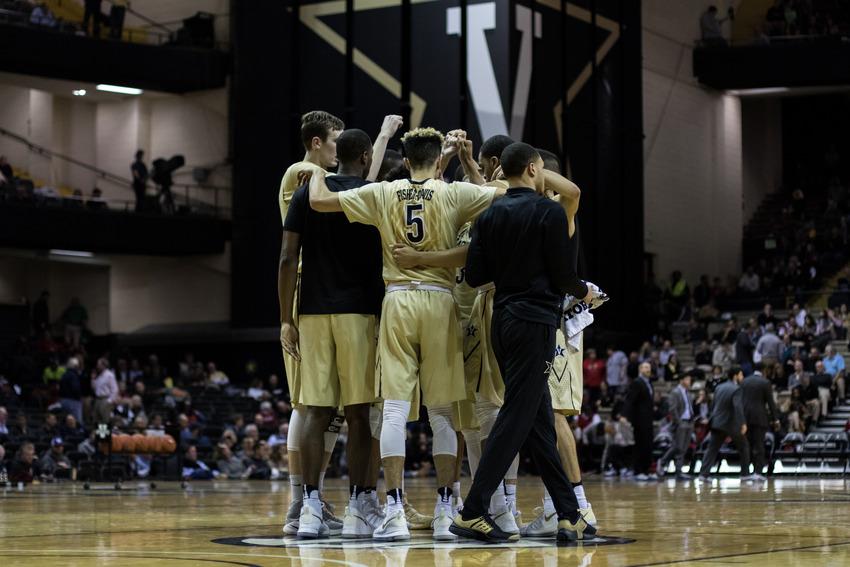Vanderbilt’s last two visits to Texas A&M haven’t been pleasant.
Coming off an energizing non-conference win over Iowa State, the Commodores (10-11, 3-5 SEC) head to College Station for a Tuesday night matchup with the Aggies (11-9, 3-5). To get a second straight win, they’ll need to overcome an environment at A&M’s Reed Arena that they’ve struggled in each of the last two seasons.
Two seasons ago, Vanderbilt fell behind by 16 points at halftime in a hapless performance that capped the team’s infamous 1-7 start to SEC play. Those ‘Dores lost only two games the rest of the regular season, but they were simply overwhelmed by an Aggies squad that didn’t even make the NCAA Tournament that year.
Last season, the Commodores hoped to effectively clinch a Tournament berth in College Station in their last game of the regular season. Again, the Aggies and the Reed Arena crowd had Vanderbilt rattled, as A&M raced out to an 18-point lead with 10 minutes remaining and closed the game out.
Much like each of the last two years, this Commodore team hasn’t shown consistent mental toughness. Vanderbilt has folded in games against Arkansas and Middle Tennessee, but it’s shown similarly impressive resolve in wins over Florida and Iowa State. While this group of Commodores hasn’t had success in College Station, Tuesday’s game will be different in one basic way: Texas A&M isn’t as good as in each of the last two years.
Both of the aforementioned losses to A&M came to NCAA Tournament-caliber Aggie teams. Head coach Billy Kennedy probably would have guided his team to the Big Dance in 2015 if star wing Danuel House had stayed healthy at the end of the season (he scored 13 points for the Aggies in the game two years ago), although that doesn’t excuse Vanderbilt’s first blowout loss. The performance of last year’s No. 3-seeded A&M group speaks for itself.
This year’s Aggies aren’t so tough, rating only two spots ahead of Vanderbilt in Ken Pomeroy’s team ratings (No. 59 to No. 61) and with less impressive wins than the Commodores’. Most of all, A&M’s putrid offense and sluggish pace mean head coach Bryce Drew’s squad should have no trouble staying within striking distance, even if the ‘Dores don’t play their best.
Kennedy’s team is a capable shooting unit when its players are left wide open, but with any type of contest the Aggies can’t hit the broad side of the barn. According to Synergy Sports Technology, A&M ranks in the 67th percentile nationally on unguarded catch-and-shoot jumpers but only in the 10th percentile on such guarded shots.
However, A&M objectively excels in the paint, even on offense. Led by the likes of star sophomore center Tyler Davis and likely NBA first-round pick freshman Robert Williams, the Aggies rate in the 96th percentile around the basket on offense at 1.313 points per possession.
It isn’t every day that a team has to deal with Luke Kornet and his 7’1″ frame, however. If Kornet can stay out of foul trouble, he should be able to make it relatively difficult on the Aggies in the paint. And if A&M can’t find consistent success around the basket, then its lack of depth in three-point threats mean it could struggle to score, even against a Vanderbilt squad that isn’t great defensively.
One of the key matchups in the game won’t come in the paint, however. Depending on injuries, Texas A&M has started junior Tonny Trocha-Morelos, a 6’10” power forward, at small forward at times. Drew, on the other hand, starts 6’5” Matthew Fisher-Davis.
Clearly, both players will have their fair shares of advantages if this specific matchup materializes.
Trocha-Morelos isn’t used to covering shooters of Fisher-Davis’ caliber, particularly those who are quicker than him and may run through multiple screens to create open shots. This would be a nightmare defensive matchup for Kennedy, and Vanderbilt will have no excuse for not lighting up the Aggies if Fisher-Davis has a relatively slow-footed big man chasing him around for any extended period.
However, Trocha-Morelos holds an obvious size and physicality advantage. A&M ranks sixth nationally in offensive rebound rate, according to KenPom.com, and Trocha-Morelos is an above average offensive rebounder. Fisher-Davis isn’t much of a rebounder himself, plus his inconsistent effort and focus as well as his lack of experience matching up with big men mean he’ll be fighting an uphill battle.
If Vanderbilt can win that matchup at small forward, whether it be with Trocha-Morelos or someone else, it should be in position to challenge the Aggies. Do that and weather the Reed Arena storm, and it’ll be in position to beat them.

